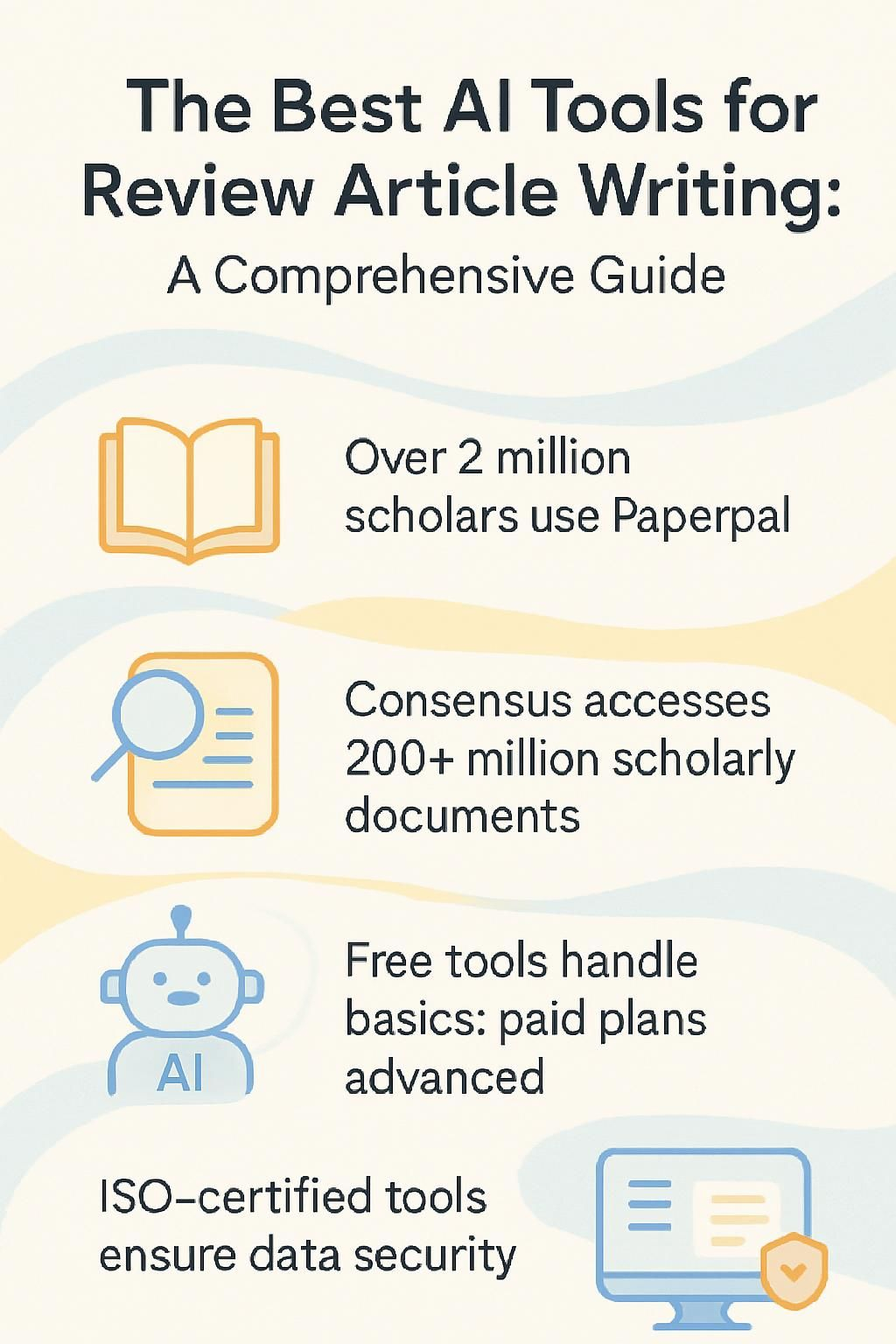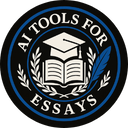Writing a review article can feel overwhelming and time-consuming. Did you know AI tools for review article writing make the process faster and easier? This guide will show you the best tools to help with research, citations, and organizing ideas.
Keep reading to find out how these tools can change your writing game!
Key Takeaways
- AI tools like Paperpal and ResearchPal save time by automating grammar checks, summarizing research papers, and generating citations.
- Over 2 million scholars trust Paperpal for drafting academic content with features like real-time edits and PDF key point extraction.
- Consensus simplifies literature reviews by accessing over 200 million scholarly documents to summarize findings quickly.
- Free AI tools can handle basic tasks, but paid plans offer advanced features for complex academic writing needs (e.g., Paperpal’s Pro Plan).
- Data security is ensured with certifications like ISO/IEC 27001:2013 in tools such as Paperpal, protecting user information during research writing.

Benefits of Using AI for Review Article Writing
AI tools can speed up writing tasks and make them more efficient. They improve the structure of articles, making research papers easier to read.
Accelerating the writing process
Paperpal has helped writers save 1.8 million hours. It speeds up the process by automating grammar checks, improving sentence clarity, and offering real-time suggestions. This tool ensures your draft is polished while reducing manual effort.
ResearchPal simplifies academic writing further with its Paper Insights feature. It can summarize research papers, extract methods, and combine key findings quickly. These functions cut down the time spent on reviewing multiple PDFs and abstracts drastically.
Enhancing accuracy and organization
AI tools improve writing by catching errors and structuring content neatly. For example, Paperpal provides precise language suggestions for scientific writing. It ensures every sentence is clear and follows academic standards.
Research papers often require proper in-text citations and smooth flow. AI analyzes data quickly to organize thoughts better. Tools like Google Docs integrate well with reference management software, making updates seamless.
“>Efficient organization leads to stronger arguments,” experts say.
Generating citations and references automatically
Creating references manually takes time. AI tools like ResearchPal simplify this process. Its Reference Generator can format citations in MLA, APA, and more styles with a few clicks.
Paperpal also offers a Research & Cite feature to access over 250 million research articles for accurate referencing.
These tools ensure accuracy while saving hours of work. They integrate with platforms like Google Scholar for quick data extraction. This automation helps writers stay focused on content creation without distractions from formatting details.
Next, explore the best AI tools available for review article writing!
Top AI Tools for Review Article Writing
Writing review articles can feel overwhelming. These AI tools make the process faster, smarter, and easier!
Paperpal: The All-in-One Research Writing Assistant
Paperpal helps streamline research writing. Trusted by over 2 million scholars, it aids in drafting papers and organizing ideas. It has perfected over 6.5 billion words, making it a reliable tool for academics.
This assistant suggests edits to improve clarity and tone. It also generates in-text citations and references with ease, saving time. Users can manage research materials efficiently using its features like PDF summarization and extracting key points from files stored on cloud storage.
Paperpal simplifies the way researchers write and edit academic content.
Jenni AI: Streamline Literature Reviews and Writing
After exploring the benefits of Paperpal, Jenni AI steps in as a powerful tool for literature reviews. It helps writers go through research papers with ease. Users can generate summaries and organize key points efficiently without manual effort.
Jenni AI simplifies writing with features like automatic in-text citations and reference generation. This saves time when handling complex academic topics such as climate change or warming studies.
Its ability to create structured content customized to your needs makes it ideal for research-related tasks.
ResearchPal: Simplify Academic Writing and Reference Integration
ResearchPal helps researchers write better and faster. It simplifies academic writing by organizing ideas and improving structure. With automatic reference management, it saves time on creating in-text citations and bibliographies.
Over 100,000 users trust this tool globally. Its Standard Plan costs just $9/month, making it affordable for students and professionals alike. Move ahead to discover other helpful AI tools for research writing!
Consensus: AI for Summarizing and Synthesizing Research Papers
Consensus helps researchers handle vast amounts of information. It accesses over 200 million scholarly documents to summarize research papers quickly. This tool highlights key points, making literature reviews easier and more efficient.
The Consensus Meter adds value by showing agreement levels between studies. Researchers gain better insight into conflicting or supportive findings. With this feature, organizing ideas for review articles becomes simple and clear.
AI Writer: Academic Content Generator for Essays and Theses
AI Writer simplifies academic writing for essays and theses. It creates structured content based on research topics, saving time. The tool helps with in-text citations and reference management automatically, making it easier to organize ideas.
This AI-powered software refines grammar and adjusts tone for formal writing. With its large language model, users can handle complex topics with clear outputs. Many rely on this tool to improve clarity while generating well-organized essays or detailed theses drafts efficiently.
Key Features of the Best AI Tools for Review Article Writing
These tools make writing clearer and more efficient. They help simplify complex research tasks, making your work smoother.
Literature review generation
Paperpal and ResearchPal excel in creating automated literature reviews. Paperpal simplifies the process by gathering relevant research papers and summarizing key points. It ensures proper organization, making review writing faster and easier.
ResearchPal stands out with its authentic citations feature. It generates accurate references while synthesizing information from trusted sources. These tools save time for researchers working on detailed academic content like review articles.
Citation and reference automation
AI tools simplify citations and references. ResearchPal offers an In-Text Citations feature, ensuring credible sources are added easily. It helps save time and avoids manual errors in formatting citations.
Paperpal performs over 30 manuscript checks, making sure every reference follows guidelines. These tools integrate with apps like Zotero for smooth citation management. Writers can focus on content quality next!
Writing tone improvement
Paperpal’s Paraphraser refines tone, word choice, and fluency with ease. It adjusts text to sound more professional or conversational based on needs. This helps writers match the desired style for research papers or literature reviews.
ResearchPal simplifies tone adjustments by rephrasing content quickly. It also lets users tweak length while staying clear and concise. These tools ensure review articles remain engaging yet formal without losing accuracy.
PDF summarization and key points extraction
AI tools simplify PDF summarization and extraction of key points. ResearchPal’s Paper Insights tool automates this process efficiently. It scans research papers, highlights crucial data, and presents it in a concise format.
This saves time for researchers during literature reviews.
Paperpal offers Chat with PDFs to extract insights quickly. Users can upload files and directly access summaries or specific information without reading the entire document. These tools enhance accuracy by focusing on relevant content from lengthy PDFs.
How to Choose the Right AI Tool for Your Needs
Picking the right AI tool depends on your writing goals and the features you need. Think about how it fits into your workflow and keeps data safe.
Specific writing stages the tool supports
AI tools like Paperpal and ResearchPal help at different writing steps. Paperpal gives text suggestions to improve sentences for clarity and flow. It also checks grammar errors, making drafting easier.
ResearchPal creates custom essays of any length, saving time in the first draft stage.
Jenni AI focuses on literature reviews by finding useful research papers quickly. It organizes sources neatly for better structure in your review article. Tools like Consensus summarize long PDFs into key points, helping with early research stages.
These features make complex tasks simpler and faster while keeping work accurate.
Integration with other tools like Zotero
ResearchPal works well with Zotero, making citation management simple. It also connects to Mendeley for added flexibility. This integration ensures quick access to saved references and citations.
Research Rabbit goes beyond basic features by offering citation-based mapping. Its seamless link with Zotero helps organize connections between studies effectively. These integrations save time during literature reviews and create accurate in-text citations easily.
Data security and privacy policies
Paperpal ensures document safety with ISO/IEC 27001:2013 certification. This standard shows a strong commitment to protecting user data and privacy during research paper writing. Such measures build trust for those sharing sensitive academic work.
Data management by ResearchPal uses OpenAI Legacy Models. These systems follow strict privacy controls while handling literature reviews and references. With tools like these, researchers can write confidently without worrying about data misuse or breaches.
Common Concerns About AI Tools in Research Writing
Writers often worry about the ethical use of AI in research. Many also question how these tools handle originality and complex ideas.
Ethics of using AI for academic purposes
AI tools for research writing raise questions about fairness and honesty. Some worry these tools might create fake references or mislead readers with incorrect information. Proper citation of AI-generated content is crucial to keep academic work ethical.
Misusing AI tools can blur the lines of originality, making it unclear who truly deserves credit.
Universities must set clear rules for using these tools responsibly. Non-native English speakers benefit from them by reducing language issues, but this raises concerns about equal opportunities in academia.
Transparency about using AI is vital to maintain trust in academic work.
Next, explore if AI-created content risks being flagged as plagiarized…
Will AI-based content be flagged as plagiarized?
AI-generated text might raise concerns about plagiarism. Tools like Paperpal offer a Plagiarism Checker for similarity checks. This feature ensures the content stays unique and avoids copying from existing sources.
Many AI tools use algorithms to create original content based on input data. ResearchPal’s Paper Insights tool helps maintain authenticity in summaries, reducing overlap with published work.
Proper citation of research papers and literature reviews also protects against flagged content.
Next, let’s discuss using AI in review paper writing methods!
Use of AI Tools in Review Paper Writing
AI tools simplify review paper writing. Paperpal works smoothly on MS Word, Overleaf, Google Docs, and the web for free. It improves drafts by fixing grammar issues and suggesting better words.
ResearchPal’s free plan costs $0 and provides limited access to test its features. It helps with reference management and handles in-text citations easily.
Jenni AI makes literature reviews faster by summarizing research papers clearly. Consensus focuses on pulling key ideas from large studies, saving hours of reading time. These tools generate accurate summaries or citations while keeping your work organized.
Frequently Asked Questions
Got questions about using AI tools for research writing? Find answers to common doubts and concerns here!
Are free AI tools as effective as paid ones?
Free AI tools can get the job done, but they often lack advanced features. For example, ResearchPal’s free plan offers limited access but lets users test basic functions like citation generation and reference management.
Paid tools usually provide more precise results and extra options. Paperpal’s paid version supports in-depth research writing across multiple platforms. Free tools may work for simple tasks, but complex academic topics often need the added power of premium versions.
Can AI tools handle complex academic topics?
AI tools can manage complex academic topics with precision. For instance, Paperpal helps researchers improve research papers by meeting strict writing standards. It ensures clear structure and proper grammar in literature reviews.
ResearchPal’s Pro Plan ($39.99/month) simplifies reference management while aiding deeper analysis of texts.
These tools also support generating citations and synthesizing data from multiple sources. Consensus excels at summarizing studies, making dense material easier to understand. Features like PDF summarization save time when handling scholarly articles or technical subjects.
Tools mentioned earlier assist in every stage of article creation—leading seamlessly to the next topic on their use for review paper writing.
Conclusion
Choosing the right AI tool can transform how you write review articles. Tools like ResearchPal and Paperpal save time, improve accuracy, and simplify research tasks. They help organize ideas, automate citations, and refine your work with ease.
Explore these tools to make writing smarter and faster!


Leave a Reply